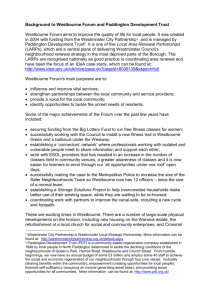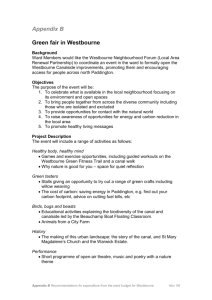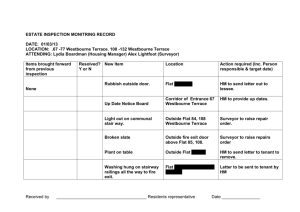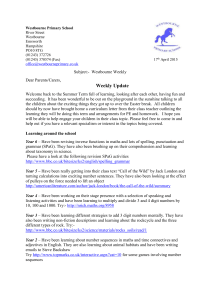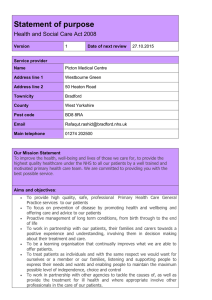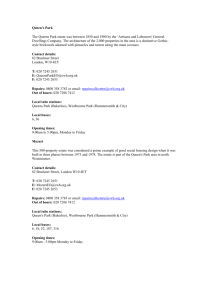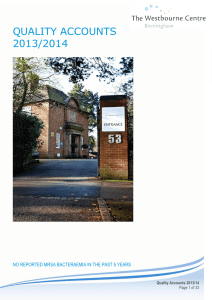QUALITY ACCOUNTS NO REPORTED MRSA BACTERAEMIA IN THE PAST 5 YEARS
advertisement
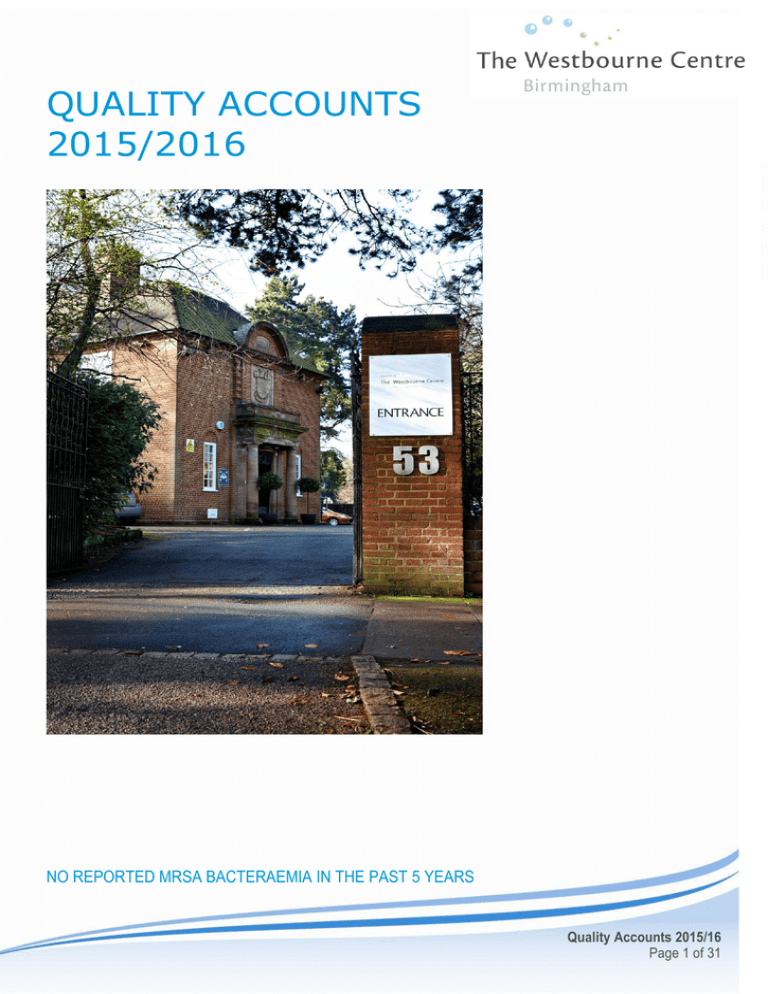
QUALITY ACCOUNTS 2015/2016 NO REPORTED MRSA BACTERAEMIA IN THE PAST 5 YEARS Quality Accounts 2015/16 Page 1 of 31 Contents Introduction Page Welcome to Ramsay Health Care UK and The Westbourne Centre Introduction to our Quality Account PART 1 – STATEMENT ON QUALITY 1.1 Statement from the General Manager 1.2 Hospital accountability statement PART 2 2.1 Priorities for Improvement 2.1.1 Review of clinical priorities 2014/15 (looking back) 2.1.2 Clinical Priorities for 2015/16 (looking forward) 2.2 Mandatory statements relating to the quality of NHS services provided 2.2.1 Review of Services 2.2.2 Participation in Clinical Audit 2.2.3 Participation in Research 2.2.4 Goals agreed with Commissioners 2.2.5 Statement from the Care Quality Commission 2.2.6 Statement on Data Quality 2.2.7 Stakeholders views on 2015/16 Quality Accounts PART 3 – REVIEW OF QUALITY PERFORMANCE 3.1 The Core Quality Account indicators 3.2 Patient Safety 3.3 Clinical Effectiveness 3.4 Patient Experience Appendix 1 – Services Covered by this Quality Account Appendix 2 – Clinical Audits Quality Accounts 2015/16 Page 2 of 31 Welcome to Ramsay Health Care UK The Westbourne Centre is part of the Ramsay Health Care Group The Ramsay Health Care Group was established in 1964 and has grown to become a global hospital group operating over 100 hospitals and day surgery facilities across Australia, the United Kingdom, Indonesia and France. Within the UK, Ramsay Health Care is one of the leading providers of independent hospital services in England, with a network of 31 acute hospitals. We are also the largest private provider of surgical and diagnostics services to the NHS in the UK. Through a variety of national and local contracts we deliver 1,000s of NHS patient episodes of care each month working seamlessly with other healthcare providers in the locality including GPs, Clinical Commissioning Group. The provision of high quality patient care is and will always be the highest priority of Ramsay Health Care UK. Of course our team of clinical staff and consultants are very much at the forefront of achieving this but there is also very much an organisation wide commitment to ensure that we continue to improve out outcomes every day, week, month and year. Delivering clinical excellence depends on everyone in the organisation. Clinical excellence cannot be the responsibility of just a few, it takes all of us to be responsible and accountable for our performance in the various roles we all play. Having an organisational culture that puts the patient at the centre of everything we do is key to ensuring we enable everyone to perform at their peak to attain great outcomes. Whilst I firmly I believe that across Ramsay we nurture the teamwork and professionalism on which excellence in clinical practice depends, we will continue to strive to get ever better. I am very proud of our long standing and major provider of healthcare services across the world and of our Ramsay very strong track record as a safe and responsible healthcare provider. It gives us pleasure to share our results with you. Mark Page Chief Executive officer Ramsay Health Care UK Quality Accounts 2015/16 Page 3 of 31 Introduction to our Quality Account This Quality Account is The Westbourne Centre’s annual report to the public and other stakeholders about the quality of the services we provide. It presents our achievements in terms of clinical excellence, effectiveness, safety and patient experience and demonstrates that our managers, clinicians and staff are all committed to providing continuous, evidence based, quality care to those people we treat. It will also show that we regularly scrutinise every service we provide with a view to improving it and ensuring that our patient’s treatment outcomes are the best they can be. It will give a balanced view of what we are good at and what we need to improve on. Our first Quality Account in 2010 was developed by our Corporate Office and summarised and reviewed quality activities across every hospital and treatment centre within the Ramsay Health Care UK. It was recognised that this didn’t provide enough in depth information for the public and commissioners about the quality of services within each individual hospital and how this relates to the local community it serves. Therefore, each site within the Ramsay Group now develops its own Quality Account, which includes some Group wide initiatives, but also describes the many excellent local achievements and quality plans that we would like to share. Quality Accounts 2015/16 Page 4 of 31 Part 1 1.1 Statement on quality from the General Manager Tony Yates General Manager, The Westbourne Centre As the General Manager of The Westbourne Centre I am passionate about ensuring that we deliver consistently high standards of care to all of our patients. Our Vision; “As a committed team of professional individuals we aim to maintain high standards of services with patient care remaining our focus for everything we do.” The Westbourne Centre has been established for 5 years. We offer a range of services to private and NHS patients, ensuring that patient care is at the centre of what we do. This is delivered through a commitment to teamwork and professionalism between all parties. Our Quality Accounts details the actions that we have taken over the past year in order to ensure that our high standards in delivering patient care are maintained and for those areas where we have identified where we can improve, we have implemented changes to our processes in order to be able to deliver the required improvements to the delivery of our patient care. Our Quality Account has been produced to provide information about how we monitor and evaluate the quality of the services that we deliver throughout The Westbourne Centre. We hope to be able to share with the reader our progressive achievements that have taken place over the past year. The Westbourne Centre has a very strong track record as a safe and responsible provider of Day Case services and we are proud to share our results. At The Westbourne Centre we believe that each member of staff plays a part in the success of the unit. We have a training and education plan which involves all members of our administrative and clinical teams. Our Quality Accounts have been developed with the involvement of our staff who have very much involved with developing a systems approach to risk management which focuses on making every effort to reduce the likelihood and consequence of an adverse event or outcome associated with treatment of a patient. To ensure a coordinated approach to the delivery of care for patients and to monitor the adherence to professional standards and legislative requirements the Clinical Effectiveness Committee and Medical Advisory Committee meet on a quarterly basis to review the clinical and safety performance of The Westbourne Centre. These committees have reviewed and commented on the details within these Quality Accounts. Quality Accounts 2015/16 Page 5 of 31 The quality accounts give all parties and providers access to quality activities and patient treatment outcomes at The Westbourne Centre. If you would like to comment or provide me with feedback then please feel free to contact me on the following number or via email; 0121 456 0880 or tony.yates@westbournecentre.com Tony Yates Quality Accounts 2015/16 Page 6 of 31 1.2 Hospital Accountability Statement To the best of my knowledge, as requested by the regulations governing the publication of this document, the information in this report is accurate. Tony Yates General Manager The Westbourne Centre Ramsay Health Care UK This report has been reviewed and approved by: Mr Fazel Fatah - MAC Chair Mr Hiroshi Nishikawa- Clinical Effectiveness Committee Chair Mr James Beech – Regional Director Ramsay Health Care UK Coordinating NHS Commissioners – Dudley CCG The management team at The Westbourne Centre work in partnership with the MAC and the CEC ensuring high quality patient care is at the centre of what we do. Regular meetings with the above committees ensure best practice and sharing of results. Quality Accounts 2015/16 Page 7 of 31 Welcome to The Westbourne Centre The Westbourne Centre is a day case hospital in the heart of the Edgbaston Medical Quarter in Birmingham. We provide fast, convenient, effective and high quality treatment for patients whether self-funding, medically insured or from the NHS. We accept private patients from the age of 3 and NHS patients over the age of 18. All of our theatre cases are performed under local anaesthetic with or without sedation, which enables patients to be discharged on the same day. (We do not have the facilities for general anaesthesia so any patients requiring general anaesthetic are transferred to our sister hospital, the West Midlands Hospital, in Halesowen). Our specialities include: Cosmetic surgery Restorative dentistry Oral and maxillofacial surgery Endodontics and orthodontics Ophthalmic surgery Orthopaedic surgery Ear, nose and throat surgery General and vascular surgery Non-surgical and beauty treatments The Westbourne Centre is centrally located with free on-site parking and is easily accessible via public transport. We also have disabled access throughout the Centre. Currently we employ a total of 17 contracted staff and this includes a mix of qualified nurses, HCAs, administration staff and receptionists. We are supported by a well qualified and experienced bank team. All Consultants undergo rigorous vetting procedures, ensuring only those who are qualified and experienced are granted practicing privileges. The hospital is strictly regulated and audited by the Care Quality Commission, the governing body responsible for maintaining standards in healthcare, and the latest report can be found at www.cqc.org.uk. For the period March 2014 to April 2015 the total number of patients treated was 1266, of which 459 (53%) were NHS and 499 (47%) were private. We offer direct referral services for self pay and insured patients. All patients requiring NHS services are referred via their General Practitioner, or other primary care providers (such as Optometrists and Dentists) directly to the hospital, either by Choose and Book or paper referral. We work closely with our commissioning CCG at Dudley to provide a range of surgical services under the NHS Standard Contract via the Choose and Book system. We also provide orthopaedic and general surgery outreach clinics in the local community. Quality Accounts 2015/16 Page 8 of 31 We hold educational sessions with local GP practices and other primary care referrers, with the help of our consultant body and clinical staff, and provide workshops for practice staff to support and assist them with the referral processes. Additional services The Westbourne Centre has access to Cavendish Imaging, an independent company based at the Centre. Cavendish Imaging provides a specialist imaging service (x-ray and CT scans) for the dental, oral and maxillofacial, facial, plastic and ENT surgeons as well as orthodontists. We also have a physiotherapist who provides treatment for post operative NHS patients and selffunding patients. Involvement in the community The Westbourne Centre is proud to support local charities and this year our nominated charity is the Edward’s Trust, a Birmingham based organisation that provides a wide range of support services to bereaved families and children. Quality Accounts 2015/16 Page 9 of 31 Part 2 2.1 Quality priorities for 2015/2016 Plan for 2015/16 On an annual cycle, The Westbourne Centre develops an operational plan to set objectives for the year ahead. We have a clear commitment to our private patients as well as working in partnership with the NHS ensuring that those services commissioned to us, result in safe, quality treatment for all patients whilst they are in our care. We constantly strive to improve clinical safety and standards by a systematic process of governance including audit and feedback from all who experience our services. To achieve these aims, we have various initiatives underway which remain on going as we are consistent in our approach. The priorities are determined by the hospitals Senior Management Team taking into account patient feedback, audit results, national guidance, and the recommendations from various hospital committees which represent all professional and management levels. Most importantly, we believe our priorities must drive patient safety, clinical effectiveness and improve the experience of all people visiting our hospital. Quality Accounts 2015/16 Page 10 of 31 Priorities for improvement 2.1.1 A review of clinical priorities 2014/15 (looking back) Cleanliness –Infection prevention and control audits continued as planned and local action plans developed as necessary to ensure the standards are met. The PLACE( Patient led Assessment of the Care Environment) audit was carried out for the first time in 2014. This year the audit has been repeated and the results published on the NHS choices website. Investment in day surgery facilities– This project is on-going at The Westbourne Centre and we have continued to improve the pathway for Day case patients as part of the national project to offer the most efficient and effective patient journey. Falls - Any slips, trips and falls for all staff and visitors were reported through the central risk management reporting network. The Westbourne Centre is monitored centrally and reviewed following any incidents. In addition to this any patient falls are reported to the Health and Safety management group where they are collated and reviewed before being reported to the Clinical Effectiveness Committee. ‘Never Events’ are serious, largely preventable patient safety incidents that should not occur if the available preventative measures have been implemented. For further details see: http://www.nrls.npsa.nhs.uk/resources/collections/never-events/ From the list of core never events, there are 3 that could affect The Westbourne Centre: Wrong site surgery Retained instrument post-operation Intravenous administration of mis-selected concentrated potassium chloride The Westbourne Centre have put preventative measures in place and there have not been any ‘Never Events’ reported in 2014/15 Acute Care Competencies / Vulnerable Adult training – All staff at The Westbourne Centre have access and training in the protection of Vulnerable Adults. Ensuring safe competent staff are available to care for patients continued to be a high priority through 2014/15. Quality Accounts 2015/16 Page 11 of 31 2.1.2 Clinical Priorities for 2015/16 (looking forward) Patient safety/ experience / clinical effectiveness RISKMAN In 2015/16 the incident reporting system will be continued to allow greater accuracy in recording incidents and will also support enhanced data and trend analysis. This will support our patient safety ethos. Ramsay Health Care UK are constantly looking at ways that risk and reporting incidents can be managed in an easier and more effective way. RISKMAN is a software reporting tool already in use in Ramsay Australia that is designed to allow all staff to log incidents directly into the system as they occur. This allows real time reporting and better ownership of incidents as it also allows those individual staff members to view the progress and outcome of any incidents reported. RISKMAN is our reporting tool for compliments and complaints and for any clinical incidents that we report both internally, centrally and nationally, for example the numbers of re-operations we perform, the numbers of readmissions of patients, deaths, infections and transfers of patients to other hospitals. Prior to RISKMAN all of these reports were generated and reported via different reporting tools. Our aim to have all corporate risks transferred from our existing hard drive store to RISKMAN has been achieved. Going forward, we aim to transfer all local risks onto RISKMAN. Infection Control The Westbourne Centre is proud of its minimal infection rates and high percentage infection control audit results. Audits are undertaken in many areas of infection control including hand hygiene and surgical site. Our aim for 2015/2016 is the continuation of our high standards by close monitoring of our patient outcomes and maintaining our excellent infection control measures. We routinely achieve 100% results in the audits and aim to maintain this high standard in the coming year. Reducing the risk of developing thrombosis VTE (formation of thrombosis following surgery) is still very high on the agenda because of the risks to health and outcomes following surgery. For that reason we continue to strive to improve reporting data and compliance to all patients at risk and to those undergoing sedation. Through careful pre assessment and risk assessment we can reassure our patients that their wellbeing is our priority. Patients are also empowered to reduce those risks by information given to them at pre assessment and by preventive treatment e.g. early mobilisation and the use of specific compression anti-embolism stockings. Quality Accounts 2015/16 Page 12 of 31 PROMS We monitor the national PROMs results for Hernia and varicose vein surgery by offering all patients who undergo this type of surgery the opportunity to complete a questionnaire before and after surgery to monitor an improvement in their quality of life. Encouraging their use identifies poor outcomes and allows us to review practice where necessary. Benchmarking through national PROMS website. Link: http://www.hesonline.nhs.uk/Ease/servlet/ContentServer?siteID=1937&categoryID=1295 PLACE April 2013 saw the introduction of PLACE, which is the new system for assessing the quality of the patient environment, replacing the old Patient Environment Action Team (PEAT) inspections. The assessments apply to hospitals, hospices and day treatment centres providing NHS funded care. We will be carrying out this audit and publishing for the first time, in 2015. PLACE will see our patients be a part of the team in assessing how the environment supports patient’s privacy and dignity, food, cleanliness and general building maintenance. It focuses entirely on the care environment and does not cover clinical care provision or how well staff are carrying out their job. These assessments take place every year and results reported publicly to help drive improvements in the care environment. The results show how all hospitals are performing nationally and locally. Patient Satisfaction Surveys Qa ResearchSurveys carried out by our external research company show that our patients are extremely satisfied when asked” please give your overall opinion of the care you received during your stay”, regularly achieving a 100% score. Although we score high in areas relating to staffing, cleanliness and treating our patients with dignity and respect, we still have areas where we can show improvement and we aim to do this in the coming year. Friends & Family – After the successful role out of in-patient and day case friends and family our next priority is the improvement in participation of the friends and family survey in the out-patient department. Quality Accounts 2015/16 Page 13 of 31 2.2 Mandatory Statements The following section contains the mandatory statements common to all Quality Accounts as required by the regulations set out by the Department of Health. 2.2.1 Review of Services During 2014/15 The Westbourne Centre provided and subcontracted 10 NHS services. The Westbourne Centre has reviewed all the data available to them on the quality of care in all 10 NHS services provided. The income generated by the NHS services reviewed in 1 April 2014 to 31st March 15 represents 100% per cent of the total income generated from the provision of NHS services by The Westbourne Centre for 1 April 2014 to 31st March 15. Ramsay uses a balanced scorecard approach to give an overview of audit results across the critical areas of patient care. The indicators on the Ramsay scorecard are reviewed each year. The scorecard is reviewed each quarter by the hospitals senior managers together with Regional and Corporate Senior Managers and Directors. The balanced scorecard approach has been an extremely successful tool in helping us benchmark against other hospitals and identifying key areas for improvement. In the period for 2014/15, the indicators on the scorecard which affect patient safety and quality were: Human Resources Staff cost % Net Revenue Agency cost as % of Total staff cost % Staff Turnover - 31.7% - 3% - 15% (all due to further advancement in careers) % Sickness Appraisal % Mandatory Training % Number of Significant Staff Injuries - 0.46% - 90% - 100% -0 Patient Formal Complaints per 1000 admissions - 6 Patient Satisfaction Score -92.3% Number of Significant Clinical Events per 1000 admissions - 5 Readmission per 1000 Admissions -5 Quality Workplace Health & Safety Score Infection Control Audit Score Consultant Satisfaction Score - 96% - 96.5% - 78% Quality Accounts 2015/16 Page 14 of 31 2.2.2 Participation in clinical audit The national clinical audits and national confidential enquiries that The Westbourne Centre was eligible to participate in during 1 April 2014 to 31st March 2015 are as follows: Elective procedures Elective surgery (National PROMs Programme) The national clinical audits and national confidential enquiries that The Westbourne Centre participated in, and for which data collection was completed during 1 April 2014 to 31st March 2015, are listed below alongside the number of cases submitted to each audit or enquiry as a percentage of the number of registered cases required by the terms of that audit or enquiry. National Clinical Audits Name of Audit Participation % cases submitted Elective surgery (National PROMs Programme) Yes 99% Although 99% of the eligible cases admitted participated in the initial part of the survey, there were less than the minimum number of required post operative surveys to reach the threshold required to gain an average score. Consequently we are unable to comment on any health gain score as this figure is not published nationally. The report of the national clinical audit from 1 April 2014 to 31st March 2015 was reviewed by the Clinical Governance Committee and The Westbourne Centre intends to take the following action to improve the quality of healthcare provided: The target for 2015 / 2016 will be for 100% cases to be submitted Local Audits There is a robust local Clinical Audit programme in place. Throughout the year 64 audits were undertaken. These included infection prevention and control, dental decontamination, theatre and dental radiology. The audit results are reviewed both nationally and at a local level by the Clinical Governance Committee. The clinical audit schedule can be found in Appendix 2. The Westbourne Centre intends to take the following actions to improve the quality of healthcare provided. Quality Accounts 2015/16 Page 15 of 31 -Surgical safety checklist Audit This audit is carried out quarterly and our average score was 97% Our aim for 2015/2016 is to achieve 100% This target will be achieved by ensuring the WHO surgical checklist is completed in full for all patients -Care of the deteriorating patient This audit is carried out Bi annually and our average score was 97% Our aim for 2014/2015 is to achieve 98% Following some updated training we are now in the process of following procedure for post operative care regarding the care plan pathway and have started to score assess the patients. Up until now and the explanation for the low score, all observations were recorded on the post operative chart. They are now being recorded on the specific Early Warning Score document form and this will reflect in the score for the next audit. 2.2.3 Participation in Research There were no patients recruited during 2014/15 to participate in research approved by a research ethics committee. 2.2.4 Goals agreed with our Commissioners using the CQUIN (Commissioning for Quality and Innovation) Framework A proportion of The Westbourne Centre’s income from 1 April 2014 to 31st March 2015 was conditional on achieving Quality Improvement and Innovation goals agreed between them and any person or body they entered into a contract, agreement or arrangement with for the provision of NHS services, through the Commissioning for Quality and Innovation payment framework. CQUINS for 2014/2015 Friends and Family test ( Staff and patients) Culture of learning Patient safety culture Obesity management The Westbourne Centre have been successful in achieving 100% in the CQUINs for this period. 2.2.5 Statements from the Care Quality Commission (CQC) The Westbourne Centre is required to register with the Care Quality Commission and its current registration status on 31st May 2015, is registered without conditions. Quality Accounts 2015/16 Page 16 of 31 The Westbourne Centre has not participated in any special reviews or investigations by the CQC during the reporting period. 2.2.6 Data Quality The Westbourne Centre submits both national and quality data at required reporting periods. Examples include: Mixed sex breaches Duty of candour Preventing people dying prematurely ( recording of smoking status) Ensuring people have a positive experience of care ( patient questionnaires) We consistently achieve 100% in most of our quality measures and aim to continue this for 2015/2016 NHS Number and General Medical Practice Code Validity The Westbourne Centre submitted records during 2014/15 to the Secondary Users Service(SUS) for inclusion in the Hospital Episode Statistics (HES) which are included in the latest published data. The percentage of records in the published data which included: The patient’s valid NHS number was: 100% for admitted patient care; 100% for out patient care; and 0% for accident and emergency care (not undertaken at our hospital). The General Medical Practice Code was: 100% for admitted patient care; 100% for out patient care; and 0% for accident and emergency care (not undertaken at our hospital). Quality Accounts 2015/16 Page 17 of 31 Information Governance Toolkit attainment levels Ramsay Group Information Governance Assessment Report score overall score for 2014/2015 was 75% and was graded ‘green’ (satisfactory). This information is publicly available on the DH Information Governance Toolkit website at: https://www.igt.hscic.gov.uk Clinical coding error rate The Westbourne Centre was not subject to the Payment by Results clinical coding audit during 2014/15 by the Audit Commission. 2.2.7 Stakeholders views on 2014/15 Quality Account Dudley CCG as Lead Coordinating Commissioners have had the opportunity to review this document and at time of publishing have not requested any feedback be added. Quality Accounts 2015/16 Page 18 of 31 Part 3: Review of quality performance 2014/2015 Statements of quality delivery Fiona Brown Clinical Lead Review of quality performance 1st April 2014 - 31st March 2015 Introduction This publication marks the sixth successive year since the first edition of Ramsay Quality Accounts. Through each year, month on month, we analyse our performance on many levels, we reflect on the valuable feedback we receive from our patients about the outcomes of their treatment and also reflect on professional opinion received from our doctors, our clinical staff, regulators and commissioners. We listen where concerns or suggestions have been raised and, in this account, we have set out our track record as well as our plan for more improvements in the coming year. This is a discipline we vigorously support, always driving this cycle of continuous improvement in our hospitals and addressing public concern about standards in healthcare, be these about our commitments to providing compassionate patient care, assurance about patient privacy and dignity, hospital safety and good outcomes of treatment. We believe in being open and honest where outcomes and experience fail to meet patient expectation so we take action, learn, improve and implement the change and deliver great care and optimum experience for our patients.” Vivienne Heckford Director of Clinical Services Ramsay Health Care UK Ramsay Clinical Governance Framework 2015 The aim of clinical governance is to ensure that Ramsay develop ways of working which assure that the quality of patient care is central to the business of the organisation. The emphasis is on providing an environment and culture to support continuous clinical quality improvement so that patients receive safe and effective care, clinicians are enabled to provide that care and the organisation can satisfy itself that we are doing the right things in the right way. It is important that Clinical Governance is integrated into other governance systems in the organisation and should not be seen as a “stand-alone” activity. All management systems, clinical, financial, estates etc, are inter-dependent with actions in one area impacting on others. Quality Accounts 2015/16 Page 19 of 31 Several models have been devised to include all the elements of Clinical Governance to provide a framework for ensuring that it is embedded, implemented and can be monitored in an organisation. In developing this framework for Ramsay Health Care UK we have gone back to the original Scally and Donaldson paper (1998) as we believe that it is a model that allows coverage and inclusion of all the necessary strategies, policies, systems and processes for effective Clinical Governance. The domains of this model are: • • • • • • Infrastructure Culture Quality methods Poor performance Risk avoidance Coherence Ramsay Health Care Clinical Governance Framework Quality Accounts 2015/16 Page 20 of 31 National guidance Ramsay also complies with the recommendations contained in technology appraisals issued by the National Institute for Health and Clinical Excellence (NICE) and Safety Alerts as issued by the NHS Commissioning Board Special Health Authority. Ramsay has systems in place for scrutinising all national clinical guidance and selecting those that are applicable to our business and thereafter monitoring their implementation. 3.1 The Core Quality Account indicators Mortality: Period Best Jan13-Dec13 RKE 0.62 Worst RXL Average Period Westbourne 1.18 Eng 1 2013/14 NVC44 0 Apr13-Mar14 RKE 0.54 RBT 1.20 Eng 1 2014/15 NVC44 0 The Westbourne Centre considers that this data is as described for the following reason: There were no expected deaths as we do not have patients requiring palliative or long term care. PROMS: Period Best Worst Average Hernia Apr13 - Mar14 NT415 0.139 NVC11 0.008 Eng 0.085 Apr14 - Sep14 RXR 0.125 Several 0.009 Eng 0.081 Period Westbourne Apr13 - Mar14 NVC44 Apr14 - Sep14 NVC44 The Westbourne Centre considers that this data is as described for the following reason: The Westbourne Centre did not have sufficient numbers of patients taking part in this audit to be included in the %s The Westbourne Centre has taken the following action to improve this number and so the quality of its services:By an increase in the relevant services available through the introduction of satellite clinics PROMS: Period Best Worst Average Veins Apr13 - Mar14 RTH 11.292 NT350 -16.849 Eng -8.698 Apr14 - Sep14 RYJ -4.567 RWA -16.762 Eng -9.479 Period Westbourne Apr13 - Mar14 NVC44 Apr14 - Sep14 NVC44 Quality Accounts 2015/16 Page 21 of 31 The Westbourne Centre considers that this data is as described for the following reason: The Westbourne Centre did not have sufficient numbers of patients taking part in this audit to be included in the %s The Westbourne Centre has taken the following action to improve this number and so the quality of its services:By an increase in the relevant services available through the introduction of satellite clinics PROMS: Period Best Worst Average Period Hips Apr13 - Mar14 NT441 24.444 RQX 17.634 Eng 21.34 Apr14 - Sep14 RCB 25.418 RJD 18.357 Eng 21.922 Westbourne Apr13 - Mar14 NVC44 Apr14 - Sep 14 NVC44 The Westbourne Centre considers that this data is as described for the following reason: The Westbourne Centre do not undertake this type of procedure. PROMS: Period Best Worst Average Period Knees Apr13 - Mar14 NT404 19.762 NV323 12.049 Eng 16.248 Apr14 - Sep14 RWP 20.44 RXF 14.416 Eng 16.702 Westbourne Apr13 - Mar14 NVC44 Apr14 - Sep14 NVC44 The Westbourne Centre considers that this data is as described for the following reason: The Westbourne Centre do not undertake this type of procedure. Readmissions: Period Best Worst Average Period Westbourne 2010/11 Multiple 0.0 5P5 22.76 Eng 11.43 2010/11 NVC44 0 2011/12 Multiple 0.0 5NL 41.65 Eng 11.45 2011/12 NVC44 0 The Westbourne Centre considers that this data is as described for the following reason: The Westbourne Centre has had no NHS readmissions. It is a day case hospital and the type of procedures carried out, would rarely warrant a readmission. Responsiveness: Period Best Worst Average to personal 2012/13 RPC 88.2 RJ6 68.0 Eng 76.5 needs 2013/14 RPY 87.0 RJ6 67.1 Eng 76.9 Period Westbourne 2013/14 NVC44 0.0 2014/15 NVC44 0.0 The Westbourne Centre considers that this data is as described for the following reason: The Westbourne Centre is a day case hospital and so this indicator will not apply VTE Assessment: Period Best 14/15 Q2 Several 100% Worst RNL Average Period Westbourne 86.4% Eng 96.2% 14/15 Q2 NVC44 100.0% 14/15 Q3 Several 100% NT322 85.1% Eng 96.0% 14/15 Q3 NVC44 100.0% Quality Accounts 2015/16 Page 22 of 31 The Westbourne Centre considers that this data is as described for the following reasons: The Westbourne Centre carry out an assessment on all admissions and record the data appropriately. This indicator is also monitored internally, through the monthly audit programme. C. Diff rate: Period Best Worst Average Period per 100,000 2012/13 Several 0 RVW 30.8 Eng 17.4 bed days 2013/14 Several 0 RMP 32.5 Eng 14.7 Westbourne 2012/13 NVC44 0.0 2013/14 NVC44 0.0 NHS Data Until 2013/14 14/15 not published yet The Westbourne Centre considers that this data is as described for the following reason: The Westbourne Centre has no cases to report. It is a day case hospital and patients are unlikely to contact C.Diff during such a short hospital stay. SUIs: Period Best Worst Average RBD 0 R1F 3.72 Eng 0.43 (Severity 1 only) Oct 13 - Mar 14 Apr - Sep 14 Several 0 RBZ 1.09 Eng 0.17 Period Westbourne Oct13-Mar14 NVC44 0.00 Apr-Sep14 NVC44 0.00 The Westbourne Centre considers that this data is as described for the following reason:-There have been no serious incidents at The Westbourne Centre recorded on “Riskman”. This open system of reporting incidents is closely monitored and reported on by the Ramsay Corporate team at Head Office and results shared and nationally. F&F Test: Period Best Jan-15 Several 100% Worst RPA02 Feb-15 Several 100% RHU10 Average 51.2% Eng 94.0% 75% Eng 94.7% Period Westbourne Jan-15 NVC44 0.0% Feb-15 NVC44 0.0% The Westbourne Centre considers that this data is as described for the following reason:-The Westbourne Centre take part in the F&F test but the numbers are not included in the national average as we are a day case hospital only. Quality Accounts 2015/16 Page 23 of 31 3.2 Patient safety We are a progressive hospital and focussed on stretching our performance every year and in all performance respects, and certainly in regards to our track record for patient safety. Risks to patient safety come to light through a number of routes including routine audit, complaints, litigation, adverse incident reporting and raising concerns but more routinely from tracking trends in performance indicators. 3.2.1 Infection prevention and control The Westbourne Centre has a very low rate of hospital acquired infection and has had no reported MRSA Bacteraemia in the past 6 years. We comply with mandatory reporting of all Alert organisms including MSSA/MRSA Bacteraemia and Clostridium Difficile infections with a programme to minimise potential incidents year on year. Infection Prevention and Control management is very active within our hospital. An annual strategy is developed by a corporate level Infection Prevention and Control (IPC) Committee and group policy is revised and re-deployed every two years. Our IPC programmes are designed to bring about improvements in performance and in practice year on year. A network of specialist nurses and infection control link nurses operate across the Ramsay organisation to support good networking and clinical practice. Programmes and activities within our hospital include: Link personnel from The West Midlands Hospital support our own lead IC nurse at The Westbourne Centre and we have links with our local NHS Trust Microbiologist and local NHS Trust Infection Control Nurses. E-Learning and Mandatory training sessions held for all clinical staff. Actively involving the infection control nurse in working in the clinical environments to audit and advise staff members and consultants in infection control issues including hand hygiene. Our lead Infection control nurse advises staff on reporting mechanisms for infections /wound problems using examples of reporting tools and policies available. A graph cannot demonstrate the extremely low HCAI rate of 0.001% for 2014/2015. Quality Accounts 2015/16 Page 24 of 31 The Westbourne Centre is proud of the low figure and will aim to continue with such vigilance in monitoring and auditing infection control, in the forthcoming year. 3.2.2 Cleanliness and hospital hygiene Assessments of safe healthcare environments also include Patient-Led Assessments of the Care Environment (PLACE) PLACE assessments occur annually within the Ramsay group and The Westbourne Centre will take part again this year .It provides us with a patient’s eye view of the buildings, facilities and food we offer, giving us a clear picture of how the people who use our hospital see it and how it can be improved. . The main purpose of a PLACE assessment is to get the patient view. We are pleased to be able to display our results from this year’s audit – 3.2.3 Safety in the workplace Safety hazards in hospitals are diverse ranging from the risk of slip, trip or fall to incidents around sharps and needles. As a result, ensuring our staff have high awareness of safety has been a foundation for our overall risk management programme and this awareness then naturally extends to safeguarding patient safety. Our record in workplace safety as illustrated by accidents per 1000 admissions demonstrates the results of safety training and local safety initiatives. Quality Accounts 2015/16 Page 25 of 31 Effective and ongoing communication of key safety messages is important in healthcare. Multiple updates relating to drugs and equipment are received every month and these are sent in a timely way via an electronic system called the Ramsay Central Alert System (CAS). Safety alerts, medicine / device recalls and new and revised policies are cascaded in this way to our General Manager which ensures we keep up to date with all safety issues. All staff are actively encouraged to report incidents as by doing this we can identify areas for improvement. All incidents are then reviewed by the Health and Safety Team, root cause analysis is carried out and any trend and or recommendation is acted upon. They are also reported into the central reporting tool, “RISKMAN”, to ensure trends and key issues are highlighted group wide and lessons shared/actions taken across the company where necessary in a timely and structured fashion. All incidents that are reported on are divided into subsections separating clinical from nonclinical, with clinical incidents coming under the umbrella of clinical effectiveness. Annual risk assessment audits maintain up to date and effective safe practice within the Centre 3.3 Clinical effectiveness The Westbourne Centre has a Clinical Governance team that meet regularly through the year to monitor quality and effectiveness of care. Clinical incidents, patient and staff feedback are systematically reviewed to determine any trend that requires further analysis or investigation. More importantly, recommendations for action and improvement are presented to hospital management and medical advisory committees to ensure results are visible and tied into actions required by the organisation as a whole. 3.3.1 Return to theatre The Westbourne centre is treating significantly higher numbers of patients every year as our services grow. The majority of our patients undergo planned surgical procedures and so monitoring numbers of patients that require a return to theatre for supplementary treatment is an important measure. Every surgical intervention carries a risk of complication so some incidence of returns to theatre is normal. The value of the measurement is to detect trends that emerge in relation to a specific operation or specific surgical team. Ramsay’s rate of return is very low and consistent with our track record of successful clinical outcomes. The Westbourne Centre has a 0.7% return to theatre rate for 2014/2015. . 3.4 Patient experience All feedback from patients regarding their experiences with The Westbourne Centre are welcomed and inform service development in various ways dependent on the type of experience (both positive and negative) and action required to address them. Quality Accounts 2015/16 Page 26 of 31 All positive feedback is relayed to the relevant staff to reinforce good practice and behaviour – letters and cards are displayed for staff to see in staff rooms and notice boards. Managers ensure that positive feedback from patients is recognised and any individuals mentioned are praised accordingly. All negative feedback or suggestions for improvement are also fed back to the relevant staff using direct feedback. All staff are aware of our complaints procedures should our patients be unhappy with any aspect of their care. Patient experiences are fed back via the various methods below, and are regular agenda items on Local Governance Committees and at Head of department meetings for discussion, trend analysis and further action where necessary. Escalation and further reporting to Ramsay Corporate and Dept of Health bodies occurs as required and according to Ramsay and DH policy. Feedback regarding the patient’s experience is encouraged in various ways via: Continuous patient satisfaction feedback via a web based invitation Hot alerts received within 48hrs of a patient making a comment on their web survey Yearly CQC patient surveys Friends and family questions asked on patient discharge ‘We value your opinion’ leaflet Verbal feedback to Ramsay staff - including Consultants, Matrons/General Managers whilst visiting patients and Provider/CQC visit feedback. Written feedback via letters/emails Patient focus groups PROMs surveys Care pathways – patient are encouraged to read and participate in their plan of care Quality Accounts 2015/16 Page 27 of 31 3.4.1 Patient Satisfaction Surveys put in graphs Our patient satisfaction surveys are managed by a third party company called ‘Qa Research’. This is to ensure our results are managed completely independently of the hospital so we receive a true reflection of our patient’s views. Every patient is asked their consent to receive an electronic survey or phone call following their discharge from the hospital. The results from the questions asked are used to influence the way the hospital seeks to improve its services. Any text comments made by patients on their survey are sent as ‘hot alerts’ to the Hospital Manager within 48hrs of receiving them so that a response can be made to the patient as soon as possible. Satisfaction Scores NHS/Private Patients Satisfaction Scores 120 100 80 60 40 100.0 92.3 2013/14 2014/15 20 0 The Westbourne Centre As can be seen in the above graph our patients are 92.3% satisfied. This relates to the questions asked” please give your overall opinion of the quality of your care” and “How likely are you to refer your friends and family to the hospital”. The slight decline in results from the previous year reflect the 100% increase in business. We will endeavour to aim for 97% in the forthcoming year. Although we score high in areas relating to staffing, cleanliness and treating our patients with dignity and respect, we still have areas where we can improve and these include giving patients enough information about their medication prior to discharge including any potential side effects. Quality Accounts 2015/16 Page 28 of 31 Appendix 1 Services covered by this quality account Treatment of Disease, Disorder or Injury Lasers for - Hair Reduction - Vascular/Pigmented Lesions - Laser Eye Surgery Shockwave Therapy Ambulatory and day surgery Surgical Procedures Diagnostic All surgical Treatments under LA/ Sedation - Dental implants Minor oral/periodontal surgery Cosmetic Dermatological General Surgery Ophthalmic Minor Orthopaedic ENT - Phlebotomy Specimen collection Histology - Quality Accounts 2015/16 Page 29 of 31 Appendix 2 – Clinical Audit Programme. Each arrow links to the audit to be completed in each month Ramsay Health Care UK - Clinical Governance Audit Programme 2014/15 Quality Accounts 2015/16 Page 30 of 31 THE WESTBOURNE CENTRE We would welcome any comments on the format, content or purpose of this Quality Account. If you would like to comment or make any suggestions for the content of future reports, please telephone or write to the General Manager using the contact details below. For further information please contact: 0121 456 0880 www.westbournecentre.com Neurological Centres Quality Accounts 2013/14 Page 31 of 31
